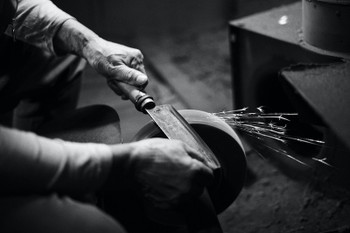Caring For Your Knives In The Cold
Posted by EKnives on Dec 21st 2023
You winterize your sprinklers. You winterize your tires. You winterize your wardrobe. Should you also winterize your knives?
Knife use can be a little different during the winter months. And if you plan on putting your knife away until the weather is warmer, you will want to take some precautions to do it correctly. This guide will help you care for your knife through the cold, whether you’re outside using it or storing it away inside.
Wintertime Knife Use
For those who could be extras in “The Revenant,” willing to brave the freezing temperatures to hunt or camp in the elements, you will want to be prepared with a little knife knowledge before your chilly adventure.
Remember that when things are frozen, they are harder. If you try to cut frozen wood, you will find that it is as hard as a rock. This can be detrimental to your blade. If possible, avoid using your knife on frozen wood.
However, if using your knife to cut through frozen wood is your only option to build a fire, it’s more important to warm up than to preserve your knife. While you may not feel like it at the time, a knife is replaceable; you are not. Keep in mind that starting a fire in the snow with frozen fingers is a lot more difficult than it was in the summer. If possible, plan to have a source of wood that will not break your blade.
If you think you will be using a knife on frozen wood, bring your sharpening kit along with you. Or better yet, check out axes for sale before setting off.
Each time you use a knife in the wintertime, clean it well. Moisture goes hand in hand with the winter months, and knives hate moisture. To keep your knife in its best condition, make sure it is cleaned and dried after each use.
The cold air may have another negative impact on your knife. Metal can become more brittle when the temperature drops. Instead of having some give and bend, your blade may actually break depending on its material if you cut in the cold.
Wintertime Knife Storage and Care
For many knife users, the winter is a time for knives to be stored until it is warm again. These tips will help you store your knife well during the winter months:
- Assess the damage. If you have any chips or other damages on your blade, address them before storing your knife away for the winter. File out the edge. Sharpen the blade. Peen the pins. When you put away a project, you have more time than when you go to pull something out to use it.
- Dry, dry, dry. Have we mentioned your knife should be dry yet? It really is essential to the integrity of your knife to keep it dry while it is stored. Moisture can make a knife rust. Blood left on the blade can lead to corrosion.
- Don’t forget the sheath. If you use a leather sheath, you will also want to ensure it is dry. If you store a leather sheath while it is wet or even damp, it will crack, which will ruin your sheath. If you try to dry it by a campfire, it will also warp or damage the sheath; let it air dry. After it is dry, treat it with some Lexol, Neatsfoot oil, or your favorite leather conditioner to help it last for years to come.
- But do not sheath the knife. For long-term storage, it’s best to let the knife out of the sheath. The oil from your knife can mix with the dyes or leather in the sheath, which can cause a chemical reaction that would hurt both your blade and your sheath.
- Know your knife. Different handle materials will have different care techniques. For a handle made from bone, you will need to care for it differently than a handle made from a synthetic material. Familiarize yourself with the nuances of your own knife.
- Oil your knife. Wipe down the blade with quality gun oil after your last use of the season. Before you use it again the following year, clean off the oil. Alternatively, you could use a small amount of wax instead of oil.
- Only for looks. If you keep your knives in a display case and not out being used year-round, they’re fine if you continue to store them how they are.
By taking a few extra precautions, you can help your knife stay in pristine condition for many years to come. The last thing you want is for your new Benchmade knives only to make it through one season. Take care of them, and you’ll build up a knife collection that will last a lifetime.

